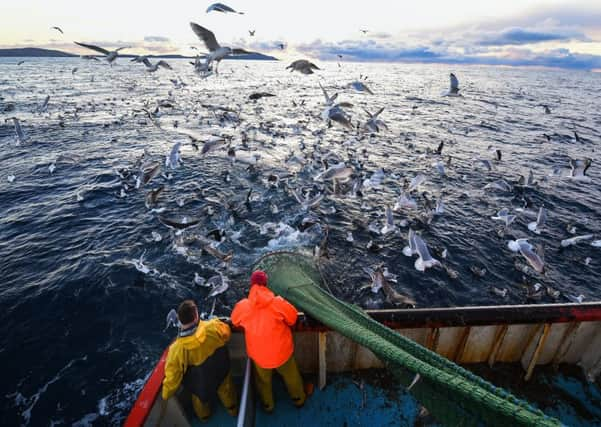Competition with humans for fish puts seabirds at risk


Birds such as puffins, guillemots, kittiwakes and gannets could disappear for ever due to the battle they face with fishing fleets to find food, a new international study has found.
The research, led by the University of Aberdeen, concludes that seabird species are the birds most threatened with extinction around the globe due to competition with humans for fish and shellfish.
Advertisement
Hide AdAdvertisement
Hide AdScientists analysed worldwide seabird surveys and annual catch figures to assesses the degree of competition seabirds faced during two 20-year timeframes – 1970 to 1989 and 1990 to 2010. They identified prey species such as anchovy, sardines, mackerel, squid, krill and crustaceans that were sought-after by both seabirds and fisheries.
The team then estimated the annual consumption of those prey species for 1,482 populations of 276 seabird species, which represents 60 per cent of all seabird populations.
Landings of the same species by international fisheries were also calculated.
The results show that the total annual seabird consumption decreased from 70 million tonnes between 1970 and 1990 to 57 million tonnes from 1990 to 2010.
Meanwhile, fishery catches increased from 59 million tonnes to 65 millions of tonnes over the same period.
Globally, seabirds populations have crashed to less than a third of levels seen in the 1950s.
Scotland is globally important for seabirds, hosting around five million – around 30 per cent of the total EU population.
Dr Aurore Ponchon, from Aberdeen’s School of Biological Sciences, said: “Our research shows that despite the decline of the world seabird community between 1970 to 1989 and 1990 to 2010, competition with fisheries remained sustained.
Advertisement
Hide AdAdvertisement
Hide Ad“This competition was even enhanced in almost half the oceans.
“This enhanced competition, in addition to other factors such as pollution, predation by invasive species on chicks, the destruction and changes in their habitat by human activities and environmental changes caused by climate change, puts seabirds at risk, making them the most threatened bird group, with a 70 per cent decline over the past seven decades.
“This study calls for an improved management of the world’s fisheries to alleviate competition pressure on seabird populations.”